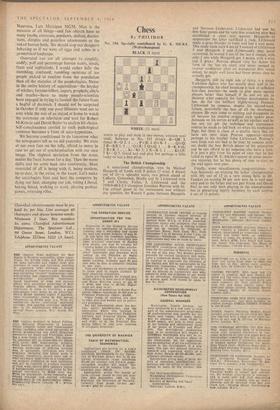Chess
By PHILIDOR No. 194. Specially contributed • by C. K. HICKS (Wolverhampton) BLACK (8 men) WHITE (11 men)
WHITE to play and mate in two moves; solution next week. Solution to • No. 193 (Fink): B—QB 3, threat B—Q 2. 1 ... PXB; 2 QX B. I . . . QXQ;
2 R—KB 1. 1 QXR; 2 QX.Q. 1 B—K 4 ch; 2 B X B. 1 . . Kt—Kt 5; 2 R—B 3. 1 . . . Kt X P; 2 Kt—Q 5. Good key and play but perhaps a little lucky to win a first prize.
The British Championship A sensational championship, won by Michael Haygarth of Leeds with 9 points (7 wins, 4 draws) out of 11—a splendid score, two points ahead of Cafferty, Golombek, Hindle and N. Littlewood with 7 and Clarke, Fuller, J. Littlewood and the 1958-9-60-1-2-3 champion Jonathan Penrose with 6. The critical game in the tournament was without any question the Round 5 game between Haygarth
and Norman Littlewood; I.ittlewood had won his first four games and by 'very fine attacking play had , established a clear .win against Haygarth—in desperation the latter sacrificed a rook. Littlewood made a gross blunder in reply and lost a won game. This made them each 4 out of 5 instead of 1.ittlewood
5 and Haygarth 3 and I.ittlewood's play never recovered; he scored 3 out of the last 6 rounds, with only.] Win while Haygarth. got 5 points with 4 wins and 2 draws. Penrose played very far below his form of the last six years and never seemed to recover confidence after an unexpected tirst round defeat; he might well have had fewer points than he actually got.
Haygarth. still the right side of thirty, is a tough Yorkshire lighter who has usually done well in the championship; his chief handicap is lack of sufficient first-class practice—he needs to play more against players better than himself if he and we are to discover what capacity for further development he has. As for the brilliant highly-strung Norman Littlewood he remains, despite his second-week, failure, potentially the best of all the developing players. He may come to nothing and disappoint us all because his creative original style makes great demands on his nerves as-well as his intellect and he has not yet got the technique and tournament routine he needs to fall back on when his inspiration flags; but there is chess of a, quality there that we have not seen since Penrose appeared—except perhaps in his brother John Littlewood. Penrose's own form was too bad to be true; he remains with- out doubt the best British player of his generation and he can afford to let someone else have a turn. It is just a pity from his point of view that he has failed to equal H. E. Atkins's record of seven succes- sive victories, but he has plenty of time to start on the trail again next year.
Finally, some miscellaneous congratulations: to Ann Sunnucks on winning the ladies' championship with 10f out of 12 in a very strong field, to Dr. Fazekas on scoring 50 per cent now he is well past sixty and to the father and son pair Frank and David, Parr in not only both playing in the championship but in preserving family harmony by each scoring 6 out of 11 points.






































 Previous page
Previous page